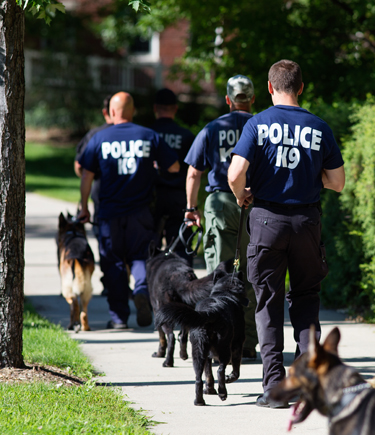K-9 Units Train on Campus

During the next few days, first-year students from all over New England and beyond will be involved in freshmen orientation at Keene State College—a chance for them to get accustomed to a new environment, plan for the semester ahead, and socialize and meet new friends.
But the students weren’t the only ones taking part in an orientation at Keene State this week. On Wednesday, Keene State welcomed K-9 units from police agencies across the state who came to use the campus for training. “We do satellite training every other week during the summer, and it essentially gets our dogs out into different locations across the state,” said Lt. George Joy, an officer from the Barrington NH Police Department. “Obviously the more environments we can put them in, the more comfortable they get.”
An officer with the Keene Police Department and a 2001 KSC grad, Josh English said the campus is an ideal location to socialize the dogs and teach them to work without being distracted. “The campus environment is ideal for training,” he said. “There are people walking by, there are other dogs, there are other animal odors. The dogs need to learn to pay attention to us.”
The K-9s passed an early test when an unleashed dog, owned by Brett Mastrangelo ’14, wondered onto the quad where they were training. “I didn’t know the training was going on,” said Mastrangelo, a former cross country and track runner for the Owls, who quickly corralled his dog Summit and put a leash on him. “Those German Shepherds look a little more intense with their ears perked up.”
Mastrangleo said his dog, a two-year-old flat-coat retriever, isn’t K-9 material. “If you leave him alone too long he starts crying, and I don’t think his nose would serve him too well for sniffing things that were suspicious, except for squirrels,” said a smiling Mastrangelo.
But training K-9s is serious business. The handlers spend countless months, days, and hours training with their dogs to respond appropriately. English said he and his dog Patriot started from square one. “Patriot was very green when I got him,” he said. “He was a new dog and didn’t know what he was doing, and I was a new handler and I didn’t know what I was doing, so we learned together.”
“The dog and I have to be able to communicate with each other. He obviously doesn’t speak English, so we communicate via body language,” added English. “I read his body language and he reads mine. That’s the biggest hurdle.”
Training is constantly reinforced. The handlers initially took their dogs for a tour of the campus, maneuvering around a series of obstacles they might confront in actual work situations. Finally arriving at the quad, the dogs once again went through a series of drills, before they were given some down time and their rewards—a combination of pull toys, Kongs, and tennis balls that they happily accepted. “This is all a big game for the dogs,” said English. “They are having fun, but they know the difference between work and play.”
According to Officer Joy, who works with a female dog named Gypsy, the dogs build a tremendous rapport with their handlers and ultimately become their work partners, handing a variety of assignments from tracking and apprehending criminals to working cases realted to narcotics. “I have my partner in the car with me and have immediate back-up,” said Joy. “If things go very bad on the street, I have someone who is going to help me out, and I have a tool at my disposal that not everybody has.”
The bond between a handler and his dog is crucial to the teams’ success. Officer Joy and Gypsy are constantly together on the job and at home. “We spend more time with our dogs than we do with our families,” said Joy.
A member of the Dover Police Department, Officer Tim Keefe, works with Gypsy’s brother Grinko. “Grinko is a little more stubborn than his sister, but he’s a good dog,” said Keefe. “I have four kids at home, and he’s great with them. When he’s at home he knows he’s a pet, and when we go to work and put his work collar on, he knows he’s at work.”
As town and municipal budgets are reduced, police and public safety departments have found the addition of a K-9 unit to be very valuable. Many of the dogs are rewarded to departments through the Working Dog Foundation (WDF), which was established to ensure that communities in New Hampshire, Massachusetts, and Maine would always be able to train and care for their K-9 corps. The handler and dog take part in an extensive training program at the NH Police Canine Academy to get certified.
Working in Franklin, the smallest city in New Hampshire, Officer Adam Donnelly was able to get his dog Max because of a grant from the WDF. “The community really came together, and the Mayor’s Task Force fund raised,” said Donnelly, who has worked with Max for just a few months. “It’s very important to have a dog. They are great deterrent to crime and bring the community together.”
Arriving at Keene State promptly at 4 p.m., the handlers and their dogs put in a full day’s work. After training on campus, they headed to industrial complexes and warehouses where they got a chance to work in dark locations.
Officer English says the opportunity to use Keene State for K-9 training enhances the strong relationship between the College and the Keene Police Force. “As far as I’m concerned, we have a great working relationship with the College,” he said. “Even today, on short notice, I asked to use the property, and it’s a non-issue. They’d welcomed us in the past to use their facility for training, and as far as a non-training environment, I feel we work very well with campus safety.”





